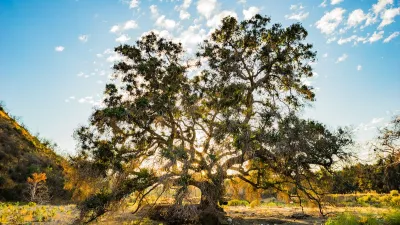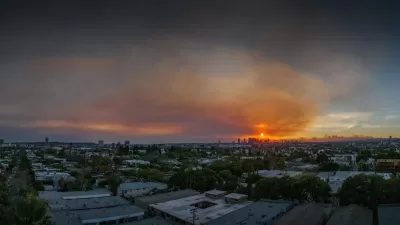L.A. must balance fire resilience with ecological preservation by gradually replacing flammable non-native plants like eucalyptus and palm trees with native and fire-resistant species while rethinking urban landscapes and land management practices.

Southern California's fire-prone environment raises questions about the role of flammable non-native plants, like eucalyptus and palm trees, in spreading wildfires. While these trees are iconic symbols of Los Angeles, they are also highly combustible and can exacerbate fire risks, especially when poorly maintained. Experts suggest a gradual transition toward native and less flammable species, such as coast live oaks and California lilacs, to create fire-resilient landscapes. However, even native plants are not entirely fireproof, as many naturally burn and regenerate, requiring careful planning to balance fire safety with ecological preservation.
This editorial emphasizes the importance of thoughtful vegetation management and land use planning to minimize fire hazards. Native plants, besides being less flammable in some cases, provide critical habitat for wildlife and promote biodiversity. Some desirable non-native species, like fruit trees, can also contribute to fire resilience in urban areas. Experts recommend planting non-native but fire-resistant species in urban cores and parks while avoiding invasive plants like fountain grass and mustard, which thrive in dry conditions and exacerbate fire spread.
As wildfires become more frequent and intense due to climate change, Los Angeles must adopt long-term strategies for sustainable rebuilding and land management. This involves creative urban planning, fire-hardened buildings, and vegetation management, supported by funding mechanisms for ongoing prevention efforts. The editorial calls for a collaborative and sustained approach to ensure that Los Angeles evolves into a safer, greener, and more resilient city, rather than simply replicating the conditions that contributed to its vulnerabilities.
FULL STORY: Editorial: After the fires, must we get rid of our flammable eucalyptus and palm trees? Maybe not

Maui's Vacation Rental Debate Turns Ugly
Verbal attacks, misinformation campaigns and fistfights plague a high-stakes debate to convert thousands of vacation rentals into long-term housing.

Planetizen Federal Action Tracker
A weekly monitor of how Trump’s orders and actions are impacting planners and planning in America.

In Urban Planning, AI Prompting Could be the New Design Thinking
Creativity has long been key to great urban design. What if we see AI as our new creative partner?

Pedestrian Deaths Drop, Remain Twice as High as in 2009
Fatalities declined by 4 percent in 2024, but the U.S. is still nowhere close to ‘Vision Zero.’

King County Supportive Housing Program Offers Hope for Unhoused Residents
The county is taking a ‘Housing First’ approach that prioritizes getting people into housing, then offering wraparound supportive services.

Researchers Use AI to Get Clearer Picture of US Housing
Analysts are using artificial intelligence to supercharge their research by allowing them to comb through data faster. Though these AI tools can be error prone, they save time and housing researchers are optimistic about the future.
Urban Design for Planners 1: Software Tools
This six-course series explores essential urban design concepts using open source software and equips planners with the tools they need to participate fully in the urban design process.
Planning for Universal Design
Learn the tools for implementing Universal Design in planning regulations.
planning NEXT
Appalachian Highlands Housing Partners
Mpact (founded as Rail~Volution)
City of Camden Redevelopment Agency
City of Astoria
City of Portland
City of Laramie





























